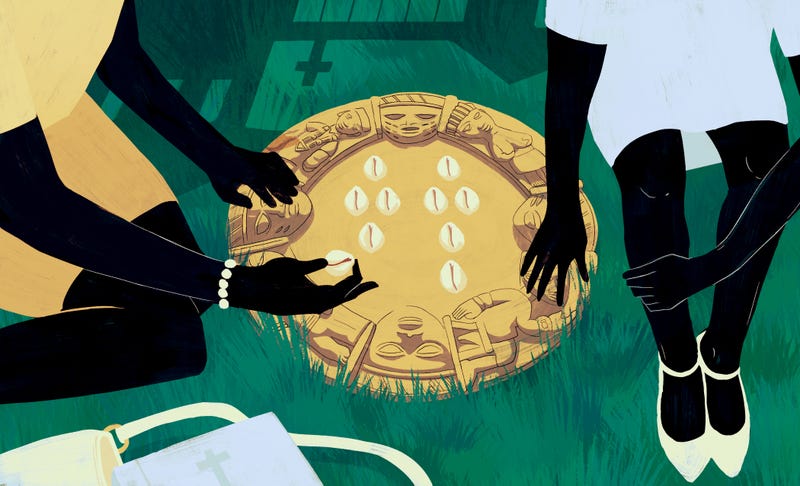FULL article in link, so support our sista 

Why More Young Black People Are Trading In Church for African Spirituality

Luna Malbroux
Monday 1:47pm
Filed to: SOUL SEARCHING
28.7K
24130

Angelica Alzona/GMG
Soul Searching is our series about how the most secular generation in history is changing the face of religion.
Let’s start off with gratitude: Thanks to the Trump era, the hypocrisy of evangelical Christians has become obvious. There should be a gold medal awarded for the outrageous feats of mental gymnastics performed by “family values” champions who condemn the LGBTQ community one minute and vote for accused sexual predator Roy Moore the next. Or pastors who will shout from their pulpit about the dangers of idolatry one Sunday, then unironically lambast Colin Kaepernick for disrespecting the flag.
Many Americans have winced at the sanctimony among the Christian community, as more people steadily move away from church. Recent pollshave shown that a fifth of Americans don’t have any religious affiliation at all, a number that is steadily growing every decade. Although black Americans still tend to be more religious than the general population, those under 30 are three times as likely to avoid religious affiliation as black people over 50. I am one of them.
But even though more young black people are leaving organized religious institutions, that doesn’t mean we’re not spiritual. Steadily, it seems like when we move away from the Christian church, we move towards less organized spiritual practices based on traditional African spirituality. There have been no knocks on the door, no pamphlets, no billboards, no late-night hotlines, no viral video campaigns. And yet, an unnamed spiritual movement reimagining African tradition and nature-centered spirituality has been growing among young black Americans.
Traditional African spirituality is an umbrella term for an assortment of beliefs that may or may not fit into a particular dogma. It can be Ifá, Vodou, Santería, Candomblé or other variations of Yoruba religious traditions, coming from the West African region of Benin, Togo and and Southwestern Nigeria. Deemed to be over 10,000 years old, the commonality of the Yoruba traditions is a reverence for spirits that reflect aspects of nature or Orishas, as well as one’s ancestors. Integration of African religious tradition can manifest as ancestor reverence, nature-based spirituality, or general witchcraft. There is a growing focus on beliefs outside of the Judeo-Christian-Islamic God, and the effects of colonialism.
many nods to African spirituality—to secret Facebook groups, and even in our activism. Weaved within the movements for black lives are spiritual and ritualistic resources such as reiki, acupuncture, sage, and herbal tinctures to increase self-care and tend to grief and trauma. Changes in our understanding of oppression brings new depths in understanding our spirituality. We have learned not only the importance of reclaiming our time, but also our history, our spirits, and our joy.
For me, the spiritual journey has been a very solitary one until recently. At first it felt like I was the only person I knew who was skeptical of Christianity and longing to know more about African traditional spirituality. Soon, I saw how wrong I was.
storybreak stars"); background-repeat: no-repeat; background-position: center center;">
Oakland, California is a city with a rich history of black pride, scholarly research, and radicalism stretching back to the Civil Rights movement and later the Black Panthers. There are emblems of African spiritual tradition everywhere—murals of the orishas, colors, names, and symbols in African Heritage Cultural centers and on neighborhood walls.
In north Oakland, there’s a store called Ancient Ways, which has stood near one of the busiest intersections for more than 28 years. A self-described “pagan metaphysical store,” the shop offers its patrons access to orisha candles, oils, herbs, stones, and cashiers giving great advice for setting up an ancestral altar. The front windows are adorned with Black Lives Matter and “Capitalism is a Pyramid Scheme” signs, along with dried flowers, watercolor paintings, and candles. Black patrons go to Ancient Ways for the necessary supplies and books for ceremonies and honoring the dead. One block away is a black hair supply store, a payday loan store, and a large black church.
via Facebook
The Oakland store is just one marker of the growing embrace of non-Christian spirituality among black folk. Jamila Kani in Washington, D.C., heads up Black Femme Witches Brew, an online and in-person safe space for black people who are searching for what she calls “remember” traditional spiritual practices.
“It was very uncomfortable for me to see that white people had become the voice of indigenous spiritualities,” she says. “I knew that there were black women and black feminine of center people who were interested in African spirituality and healing modalities. I wanted to create a way where we can explore that in safe spaces.”
Kani created the platform four years ago, but she has recently seen an increase in people from across the country, hungry for more information.
is a queer polyamorous practitioner of Ifá, a religious tradition from Nigeria.Movements such as Black Lives Matter have re-centered queer and trans women, bringing awareness to the internalized sexism, transphobia, and racism in all systems—including the church. One must, if they are honest, look at how Christian culture continues to uphold patriarchy, rape culture, and white supremacy—even within black churches. Doctrines that push respectability versus self-acceptance often focus on appearances and decorum, rather than the necessary self-awareness to create systemic change.
Writer D. Danielle Thomas addresses some of these concerns on the website Unfit Christian, a blog that focuses on faith and intersectional identities of gender, class, and race. She explores why black young women in particular are leaving the church in the article Why Black Millennials Are Leaving The Church.
“For those of us exiting your pews, we refuse to have our entire value as women be based on what lies between our thighs,” she writes. “We’re battle weary of your analogies of our bodies to cars and other inanimate objects.”
The objectification of women within the church, combined with shaming purity culture and a lack of sex and consent education, influences a broader culture that makes things like the #MeToo movement necessary. It’s a dynamic acknowledged by the recent #ChurchToo response.
https://splinternews.com/why-more-young-black-people-are-trading-in-church-for-a-1821316608


 Believe you can tell the future by looking at cowry shells brehs.
Believe you can tell the future by looking at cowry shells brehs.

